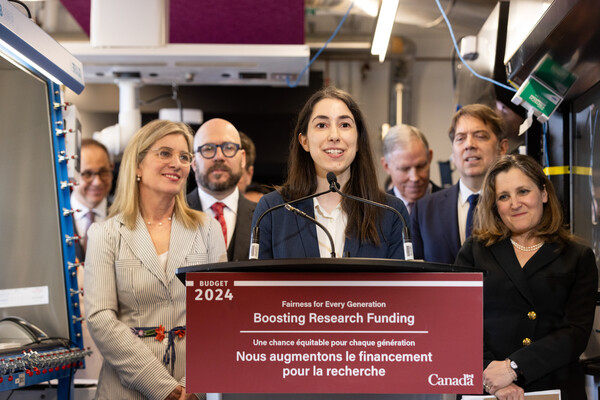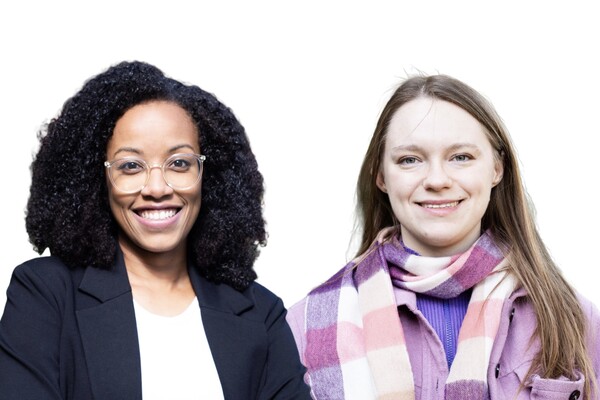Main Second Level Navigation
Breadcrumbs
- Home
- News & Events
- Recent News
- Fall Convocation 2021: Celebrating Our Newest Graduates
Fall Convocation 2021: Celebrating Our Newest Graduates
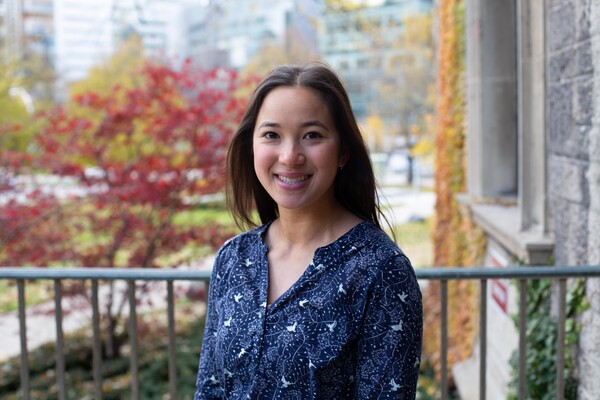
Jen Hutter, MSc Physical Therapy
I’ve always been attracted to the health care setting, but watching my dad undergo months of physical therapy after a serious accident demonstrated the life-changing impact that this profession has. I’m excited to be in a field that helps individuals re-gain function, reach their goals, and maximize their quality of life.
Throughout the research portion of the Physical Therapy (PT) program, I worked with a team of classmates to investigate aspects of LGBTQ2I+ health that should be included in Physical Therapy curricula. I developed an interest in this topic after learning about some of the unfortunate health care experiences that some members of this community and other marginalized populations have been subjected to when accessing care. My team and I are eagerly working towards publication of our study and hope to present our findings at a few upcoming conferences!
The greatest highlight of my experience at U of T has to be my time spent in clinical placements. In the PT program, we complete five six-week placements and I had the opportunity to learn in all kinds of environments – from the Intensive Care Unit with very sick COVID-19 patients, to a rehab hospital with recovering stroke survivors, to young athletes in the private practice sector. But a huge challenge that I’m still battling is the constant imposter syndrome! There are so many brilliant clinicians in the field that I look up to and it’s hard not to compare yourself. I find comfort in the fact that many of my classmates have expressed the same feelings and that even my mentors felt this way when they graduated. The positive side of this is that I’ve been able to channel my feelings of doubt into a drive to constantly be learning.
Later this year I’ll be starting jobs in both a private practice clinic and rehab hospital that I completed clinical placements at. I’m excited to start working with patients of my own and develop my own style of practice. On a lighter note, this will be the first time since kindergarten that I haven’t been a full-time student, so I’m looking forward to having some down time to spend with friends and family, and most of all…to cash my first paycheck!
My advice to incoming students is to be patient with the process. Getting into the program takes a lot of hard work and exposure to the field, and once you’re in there’s so much more to learn. This profession is all about lifelong learning and it takes years and years of practice to master the craft, so be gentle on yourself and fully embrace each part of the amazing journey.
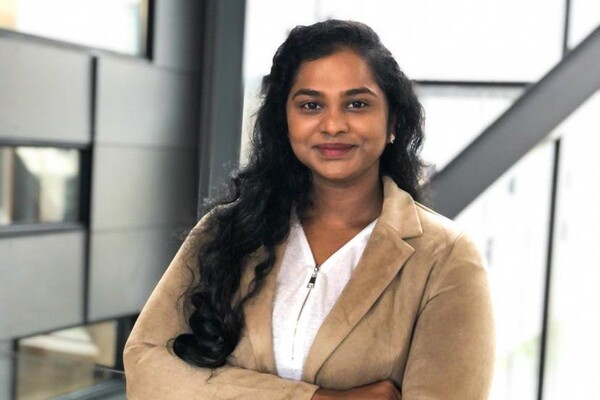
Gobika Sithamparanathan, MSc Occupational Therapy
Growing up in a war-torn country, my passion for creatively supporting folks with finite resources started from an early age and has remained close to my heart. The holistic approach occupational therapists take resonated with me and the professional I wanted to be. Occupational therapists play a crucial role in ensuring well-being in many aspects of someone’s life, including physical and psychological well-being.
Since my first year of MScOT, I have been involved in various research projects, with the hope of highlighting the often-underrepresented occupational lens in research. My research projects include evaluating leadership skill development of occupational therapists, work disability prevention, return to work, disability management and pathways to belonging in young adults with intellectual and developmental disabilities. I hope to continue to contribute to research and apply the findings in clinical settings and academia.
The best part of my experience at U of T have been the relationships I’ve built; with peers, mentors, educators, clinicians, patients/clients, family members and caregivers. COVID-19 also provided many novel opportunities to explore virtual social connectivity that I am very thankful to have utilized (i.e., national and international opportunities to represent and advocate for occupational therapy).
I currently work in the private auto insurance sector and public home healthcare sector. I am looking forward to being open to learning, making connections and continued personal and professional development in this unique profession.
To incoming OS&OT students: I would strongly suggest using the various professional and personal development opportunities that are available to you at the departmental, faculty and university level. What makes a great occupational therapist is not only the occupational therapy-specific training, but also the transferable skills you learn from getting involved in meaningful activities, i.e., creative expression through arts. I would also suggest exploring career options through different types of placement opportunities and networking with professionals, as these are valuable ways to gather insights into a practice setting and assess if your values and goals align. Most importantly, enjoy your 2 years because they go by very fast!
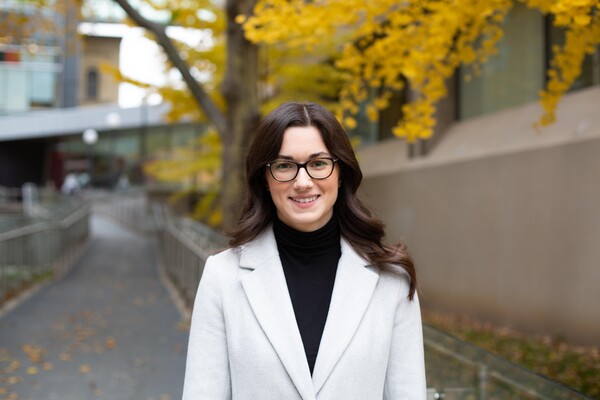
Christina Wynans, MHSc Speech-Language Pathology
After completing a BFA in Music, I worked as a professional vocalist and private music teacher. Through interactions with other professional voice users, I developed a passion for vocal rehabilitation, which eventually led me to the field of speech-language pathology.
Outside of my studies at U of T, I am involved with an interdisciplinary research project called "SingWell Canada," which aims to understand the benefits of group singing for older adults with communication disorders. I developed an interest in this area through my volunteer work with the Aphasia and Communication Disabilities Program at March of Dimes Canada, where I had the opportunity to lead music-based activities for people with aphasia.
In my first year, I started attending a lunchtime choir of speech-language pathology students. After the pandemic hit and we were no longer able to sing together in person, I worked with my peers to create two virtual choir videos: You Will Be Found (2020) and For Good (2021). I also really enjoyed my final clinical placement in General Internal Medicine at St. Michael's Hospital!
I'm currently working at Providence Healthcare in palliative care, stroke rehabilitation, and orthopedic and amputee rehabilitation. I’m looking forward to my continued growth as a clinician and plan to seek out opportunities that combine my love of music with my training in speech-language pathology.
My best advice for new students is to look to your peers for support and encouragement – I know I wouldn’t have been able to get through this degree without the help of my classmates! Not only will your peers understand what you’re going through as a student, but they will continue to support you as colleagues after graduation.
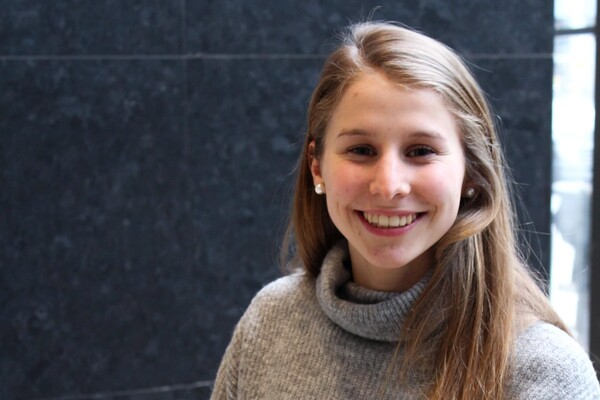
Jenny Wolever, MSc Physical Therapy
I have always loved examining human movement, and when I discovered a passion for working alongside and learning from individuals with disabilities in my undergrad, I realized physical therapy would be the perfect field to combine these interests.
I am currently working in paediatrics. In the first year of my undergrad, I started to volunteer with an afterschool program for kids with exceptionalities, and from then I have loved working with this population and am so excited that I was able to start my career in this field.
My biggest highlight from my time in the U of T MScPT program was the people I met – from classmates to professors, TAs, and clinical instructors, the field of physiotherapy is filled with incredible people, and I am so fortunate to have met and befriended a small number of them. Some of my other highlights include my clinical placements, practical lab sessions, and the professors, who taught with passion and excitement, and truly make the UofT MScPT program what it is.
The biggest challenge during my program was the sudden development of a global pandemic that quickly and drastically changed how we were learning. While I trust that this experience will make all of us stronger, more adaptable practitioners and people, it was certainly a difficult transition. Another challenge I faced was a complete shift in my way of thinking from my undergraduate and previous schooling experiences. I had to shift my mindset from that of a simple “right” and “wrong” to all questions – human beings are complicated, and therefore, a simple “right” or “wrong” doesn’t suffice.
I am currently working as a physiotherapy resident at a private paediatric clinic. Over the next few years, I am excited to take further courses to increase my knowledge of treatments I can use to optimize the care of my clients. I am looking forward to learning from the incredible practitioners around me, and hopefully being able to share some of the knowledge I am starting to gain.
To incoming students, I would recommend that they seize the learning opportunity in front of them, and to not get caught up on understanding everything immediately. For most people, and definitely for me, this program forced me to think and learn in new ways – it is okay to feel overwhelmed and confused. We as students shouldn’t have all the answers. It really is a learning process, and as hard as it is, trusting that process and embracing the potential chaos it may bring will eventually help to gain some clarity. It is also important to remember that you will never have all the answers, because no one does. This is a field of life-long learning, and fortunately, there are lots of people around who would love to help with that learning.
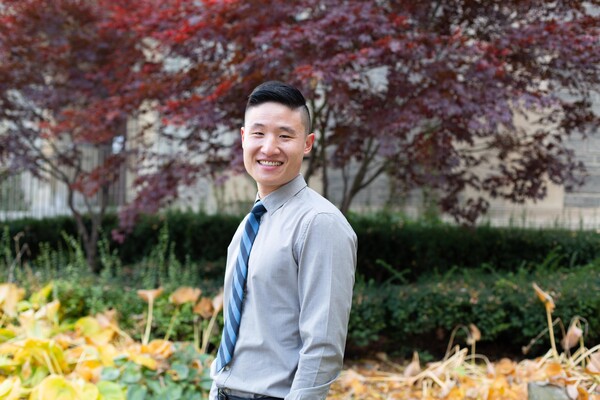
Marcus Yu, MSc Occupational Therapy
I always knew that I wanted to work with people and pursue a career on the frontline. Five years ago, occupational therapy did not mean much to me; if you asked me what it was, I probably would have said something along the lines of return to work. I had no idea that occupational therapists could be useful in so many different settings. I took an Introduction to Occupational Therapy course during my third year of my undergraduate degree, and I realized the broad scope that the profession has. That course solidified my desire to pursue a profession in occupational therapy.
Before completing the MScOT program at the University of Toronto, conducting research was never a priority that I wanted to pursue. However, after experiencing an ethical dilemma during an introductory fieldwork experience, I was encouraged by professors and faculty advisors to pursue a student-initiated research project. My research project focused on why adults choose to pursue major career transitions and how adults facilitate meaningful career transitions. For example, we wanted to know why a journalist would leave their profession to become a carpenter or why a nurse would leave their profession to become a knitter. I had the pleasure of working with an amazing partner and two phenomenal research supervisors who supported my learning and participation in research.
The disruptions caused by the COVID-19 pandemic was the biggest challenge during my time in the MScOT program at the University of Toronto. However, my classmates and I were able to support each other and stay resilient. Aside from this challenge, I had the opportunity to spend three months during the middle of winter in North Bay, Ontario, to complete a clinical fieldwork placement with the Northern Ontario School of Medicine. Additionally, I played a lead role in acquiring a Graduate Student Wellness Grant which supported a pilot project titled, The Art of Keeping Well: A Creative-Arts Hub for Graduate Students. This project will continue beyond my graduation and aims to support graduate student mental health and wellness through creative arts.
Professionally, I want to build a solid clinical foundation by exposing myself to as many different clinical experiences as possible. I really enjoy taking on leadership roles and eventually, I intend to pursue supervisory and management roles.
New and incoming students: take advantage of connections and opportunities that you will have while in school. The faculty, preceptors, guests, and peers that you will meet will help you succeed within and beyond the program. Simple introductions go a long way! Have an open mind and embrace new experiences. While you will probably feel vulnerable at times, these experiences will help you grow personally and professionally. For example, I never thought that I would be pursuing student-initiated research, completing fieldwork in Northern Ontario, or taking the lead on large student-led initiatives. Also, set your boundaries and establish a healthy work-life balance that works for you. I consistently had a full load of academic, extracurricular, and personal commitments and it was extremely important for me to find ways to recharge and stay resilient.
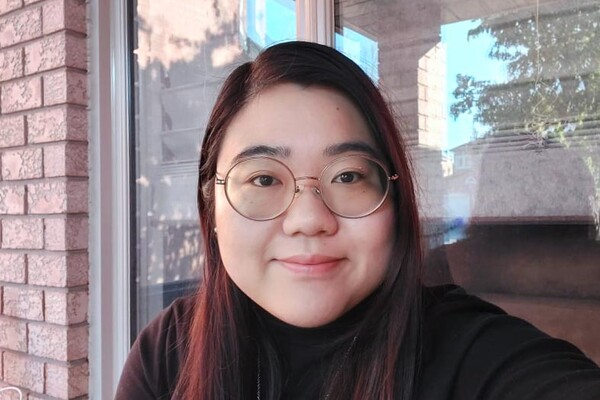
Rachel Lee, MHSc Speech-Language Pathology
I actually didn’t know what a speech-language pathologist (SLP) was until I was in my second year of my Bachelor’s. I learnt about the field when I was researching with an audiology professor. I was curious about the title, so I did Googling and learned that they help people with communicating and eating. Maybe that was what peaked my initial interest in the field – my love of words and food. After that, I looked more into the field and began some research with an SLP. It was then that I learned more about what an SLP did and where they might work. Long story (kind of) short, the reasons I chose SLP were because I believe that, 1) everyone has the right to be heard and listened to - no matter how they communicate, and 2) food and the act of eating together is an important part of life and community.
I participated in some cool research while completing my degree. It primarily focused on swallowing in patients with neurological disorders and is an area that I have been looking at since I was an undergraduate student. I think that the brain is so fascinating and have always loved learning more about how it works; therefore, after deciding to go into SLP, it just made sense to combine the two areas together.
The greatest highlight of my time in the SLP program at U of T is definitely the people. My professors and clinical educators pushed me to think critically in my decisions and always encourage reflection. My classmates…there are not enough words to express how grateful I am for their support and friendship. Despite completing the program mostly virtually, I was able to make lifelong friendships. Completing my degree remotely due to the pandemic has been a challenge. I learn much better in-person and transitioning to online learning was difficult for me. Thanks to virtual study groups and A LOT of support from friends, family, professors and U of T’s Student Services, I was able to adjust and successfully complete my degree.
Currently I’m working as an SLP at a hospital (I’m also completing my mentorship with them) and will be writing my licensing exam in early December.
My main piece of advice for incoming is to be flexible and remember your "why.” The pandemic has forced us all to be flexible, and because of that, I’ve learned about the importance of flexibility in SLP. Be flexible in terms of the populations and settings you think you want to work in, with your assessment and treatment plans, and in the way you think about everything. Remember your “why.” Like everything in life, life in the program and profession is not always easy going. Remembering why you chose to enter the profession can help you persevere when things get difficult – I know that it helped me!
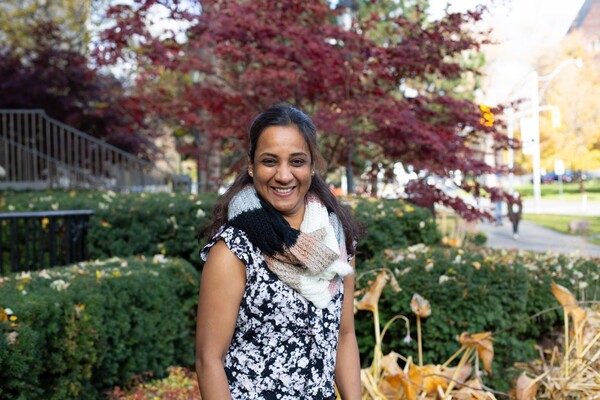
Naaz Desai (Kapadia), PhD Rehabilitation Science
I am a Physical therapist by training and have been an actively practising clinician. My entry into Physical Therapy was a chance occurrence but I have enjoyed every moment of it! I have been very fortunate to have had an opportunity to teach, treat patients and do research.
I think that Rehabilitation Sciences is an incredible field where everything you do directly impacts the quality of life of your patients and in a sense the well-being of the community at large.
My research looks at using technology to improve outcomes following acquired neurological conditions like stroke and spinal cord injury and conditions related to aging. More specifically I am interested in exploring the use of non-invasive peripheral and central nervous system stimulation for improving functional outcomes like reaching, grasping, balance and walking.
My interest in this space was sparked by the fact that although we have achieved a lot in the past 2-3 decades, we still have a long way to go in helping individuals living with devastating injuries like SCI or stroke realize their full functional potential and thereby help improve their quality of life and ability to reintegrate into the community. Part of this venture is also inspired by the incredible research that was being conducted in my lab.
RSI at U of T is a wonderful place to be. Beyond the fact that there are highly accomplished and experienced researchers at this institute, the whole atmosphere is very welcoming and inspires one to learn. I have found teachers who have gone above and beyond to help me achieve my fullest potential. I have seen how beautifully different research topics are discussed and debated in a healthy environment where one can voice their opinions freely. Outside of the classroom, student bodies have done a fantastic job at providing an inclusive social community where new friends are made over food and drinks!
Currently, I am a Post-doctoral fellow at Krembil Research Institute. I am thrilled to be working with Dr. Robert Chen who is a highly accomplished Scientist and an expert in the field of neuromodulation. My hope is to evolve into a researcher who can make a difference!
To future students: embrace and enjoy the journey! Like the saying goes, it’s about the journey more than it is about the destination.
News
